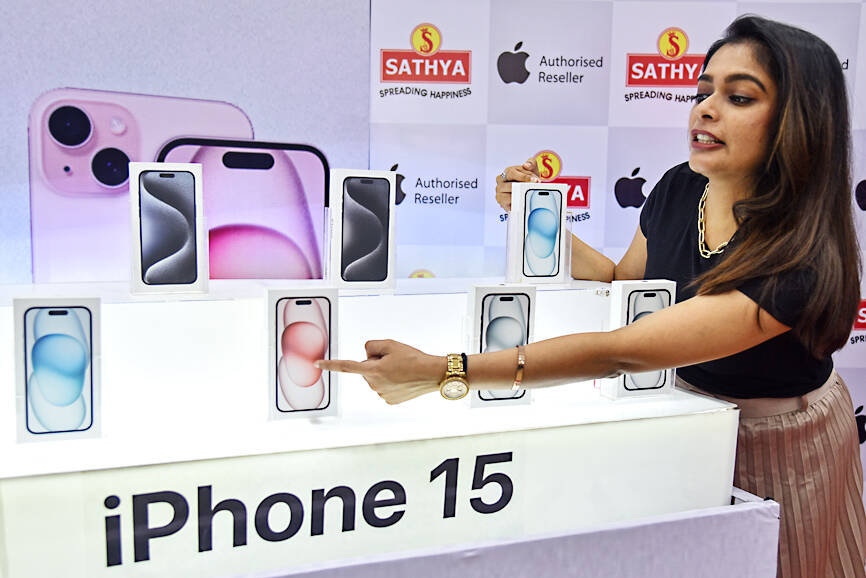Hon Hai Precision Industry Co (鴻海精密), known as Foxconn Technology Group (富士康科技集團) internationally, has won approval to invest at least US$1 billion more in a plant it is building in India that is to make Apple Inc products, a major ramp-up in its goal of building a hub beyond China.
The world’s biggest assembler of iPhones plans to spend that amount on top of the US$1.6 billion it earlier set aside for the 120-hectare site close to Bengaluru’s airport, people familiar with the matter said.
The new capital would bankroll additional capacity for Apple devices, including the iPhone, they said.

Photo: EPA-EFE
Including the most recently approved spending, Hon Hai would have set aside about US$2.7 billion for the site, set to become the centerpiece of the its manufacturing capabilities in India.
The company, Apple’s most important manufacturing partner, has ramped up its budget for the plant at least once this year. It started out in early this year with plans to invest just US$700 million in the complex, located in the southern technology hub of Karnataka.
The Karnataka government on Tuesday said that it had approved another 139.11 billion rupees (US$1.7 billion) of overall Foxconn investment in the state, without specifying details.
The company could also use the site to produce parts for its nascent electric vehicle business, people said.
Apple’s partners are accelerating efforts to establish a supply chain in India at a time when Chinese firms are edging away from the nation amid tensions between New Delhi and Beijing.
India’s Tata conglomerate, another Apple partner, is seeking to build one of India’s biggest iPhone assembly plants in Tamil Nadu state.
India’s regulatory scrutiny of smartphone makers such as Xiaomi Corp (小米) and Vivo Communication Technology Co (維沃) has also discouraged some Chinese companies from setting up operations in the world’s second-largest smartphone market.

STEEP DECLINE: Yesterday’s drop was the third-steepest in its history, the steepest being Monday’s drop in the wake of the tariff announcement on Wednesday last week Taiwanese stocks continued their heavy sell-off yesterday, as concerns over US tariffs and unwinding of leveraged bets weighed on the market. The benchmark TAIEX plunged 1,068.19 points, or 5.79 percent, to 17,391.76, notching the biggest drop among Asian peers as it hit a 15-month low. The decline came even after the government on late Tuesday authorized the NT$500 billion (US$15.2 billion) National Stabilization Fund (國安基金) to step in to buoy the market amid investors’ worries over tariffs imposed by US President Donald Trump. Yesterday’s decline was the third-steepest in its history, trailing only the declines of 2,065.87 points on Monday and

TAKING STOCK: A Taiwanese cookware firm in Vietnam urged customers to assess inventory or place orders early so shipments can reach the US while tariffs are paused Taiwanese businesses in Vietnam are exploring alternatives after the White House imposed a 46 percent import duty on Vietnamese goods, following US President Donald Trump’s announcement of “reciprocal” tariffs on the US’ trading partners. Lo Shih-liang (羅世良), chairman of Brico Industry Co (裕茂工業), a Taiwanese company that manufactures cast iron cookware and stove components in Vietnam, said that more than 40 percent of his business was tied to the US market, describing the constant US policy shifts as an emotional roller coaster. “I work during the day and stay up all night watching the news. I’ve been following US news until 3am

Six years ago, LVMH’s billionaire CEO Bernard Arnault and US President Donald Trump cut the blue ribbon on a factory in rural Texas that would make designer handbags for Louis Vuitton, one of the world’s best-known luxury brands. However, since the high-profile opening, the factory has faced a host of problems limiting production, 11 former Louis Vuitton employees said. The site has consistently ranked among the worst-performing for Louis Vuitton globally, “significantly” underperforming other facilities, said three former Louis Vuitton workers and a senior industry source, who cited internal rankings shared with staff. The plant’s problems — which have not

TARIFF CONCERNS: The chipmaker cited global uncertainty from US tariffs and a weakening economic outlook, but said its Singapore expansion remains on track Vanguard International Semiconductor Corp (世界先進), a foundry service provider specializing in producing power management and display driver chips, yesterday withdrew its full-year revenue projection of moderate growth for this year, as escalating US tariff tensions raised uncertainty and concern about a potential economic recession. The Hsinchu-based chipmaker in February said revenues this year would grow mildly from last year based on improving supply chain inventory levels and market demand. At the time, it also anticipated gradual quarter revenue growth. However, the US’ sweeping tariff policy has upended the industry’s supply chains and weakened economic prospects for the world economy, it said. “Now